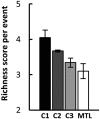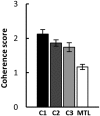The nature of recollection across months and years and after medial temporal lobe damage
- PMID: 30792351
- PMCID: PMC6410823
- DOI: 10.1073/pnas.1820765116
The nature of recollection across months and years and after medial temporal lobe damage
Abstract
We studied the narrative recollections of memory-impaired patients with medial temporal lobe (MTL) damage who took a 25-min guided walk during which 11 planned events occurred. The recollections of the patients, recorded directly after the walk, were compared with the recollections of controls tested directly after the walk (C1), after one month (C2), or after 2.6 years (C3). With respect to memory for the walk, the narrative recollections of the patients were impoverished compared with C1 but resembled the recollections of volunteers tested after long delays (C2 and C3). In addition, how language was used by the patients in their recollections resembled how language was used by groups C2 and C3 (higher-frequency words, less concrete words, fewer nouns, more adverbs, more pronouns, and more indefinite articles). These findings appear to reflect how individuals, either memory-impaired patients or controls, typically speak about the past when memory is weak and lacks detail and need not have special implications about language use and MTL function beyond the domain of memory. A notable exception to the similarity between patient narratives and the narratives of C2 and C3 was that the control groups reported the events of the walk in correct chronological order, whereas the order in which patients reported events bore no relationship to the order in which events occurred. We suggest that the MTL is especially important for accessing global information about events and the relationships among their elements.
Keywords: autobiographical memory; forgetting; hippocampus; language.
Conflict of interest statement
The authors declare no conflict of interest.
Figures









Similar articles
-
Learning and remembering real-world events after medial temporal lobe damage.Proc Natl Acad Sci U S A. 2016 Nov 22;113(47):13480-13485. doi: 10.1073/pnas.1617025113. Epub 2016 Nov 7. Proc Natl Acad Sci U S A. 2016. PMID: 27821761 Free PMC article.
-
The temporal unraveling of autobiographical memory narratives in patients with temporal lobe epilepsy or excisions.Hippocampus. 2011 Apr;21(4):409-21. doi: 10.1002/hipo.20757. Hippocampus. 2011. PMID: 20082294
-
The perceptual richness of complex memory episodes is compromised by medial temporal lobe damage.Hippocampus. 2014 May;24(5):560-76. doi: 10.1002/hipo.22249. Epub 2014 Feb 10. Hippocampus. 2014. PMID: 24449286
-
The role of recollection and familiarity in the functional differentiation of the medial temporal lobes.Hippocampus. 2010 Nov;20(11):1291-314. doi: 10.1002/hipo.20853. Hippocampus. 2010. PMID: 20928828 Review.
-
Recollections of England. 1841.Br Foreign Med Rev. 1843 Jan;15(29):19-29. Br Foreign Med Rev. 1843. PMID: 30162060 Free PMC article. Review. No abstract available.
Cited by
-
Semantic Memory and the Hippocampus: Revisiting, Reaffirming, and Extending the Reach of Their Critical Relationship.Front Hum Neurosci. 2020 Jan 24;13:471. doi: 10.3389/fnhum.2019.00471. eCollection 2019. Front Hum Neurosci. 2020. PMID: 32038203 Free PMC article. Review.
-
Decoding episodic autobiographical memory in naturalistic virtual reality.Sci Rep. 2024 Oct 27;14(1):25639. doi: 10.1038/s41598-024-76944-3. Sci Rep. 2024. PMID: 39463396 Free PMC article.
References
-
- Squire LR. Memory and the hippocampus: A synthesis from findings with rats, monkeys, and humans. Psychol Rev. 1992;99:195–231. - PubMed
-
- Gabrieli JDE. Cognitive neuroscience of human memory. Annu Rev Psychol. 1998;49:87–115. - PubMed
-
- Eichenbaum H, Cohen NJ. From Conditioning to Conscious Recollection: Memory Systems of the Brain. Oxford Univ Press; New York: 2004.
-
- Manns JR, Hopkins RO, Squire LR. Semantic memory and the human hippocampus. Neuron. 2003;38:127–133. - PubMed
-
- Milner B. Disorders of learning and memory after temporal lobe lesions in man. Clin Neurosurg. 1972;19:421–446. - PubMed
Publication types
MeSH terms
Grants and funding
LinkOut - more resources
Full Text Sources
Medical
Molecular Biology Databases
Miscellaneous

